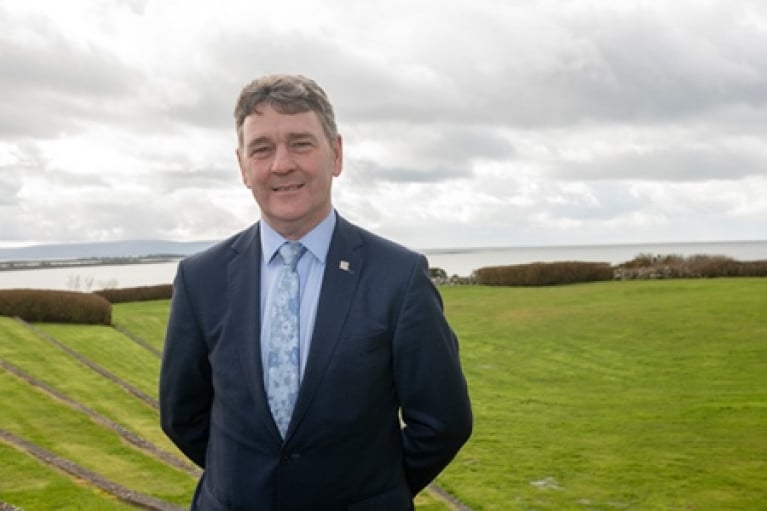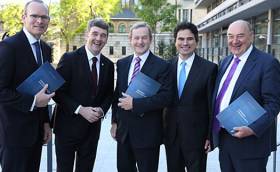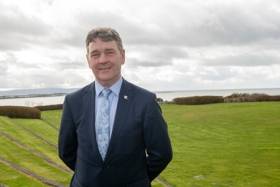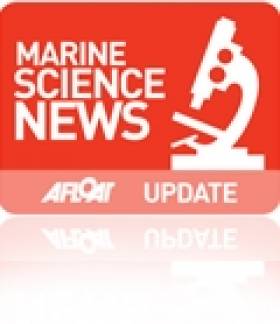Displaying items by tag: Dr Peter Heffernan
Former Marine Institute CEO Appointed Chair to Leading Research Council
The former chief executive of the Marine Institute has been appointed as the new chair of the council of the Dublin Institute for Advanced Studies (DIAS).
Dr Peter Heffernan served as the Marine Institute’s CEO for 27 years, retiring from the post in October 2019, and his new role is with the world’s second — and Ireland’s only — institute for advanced studies.
DIAS leads Ireland’s participation in a number of international research endeavours that focus on the big, unanswered questions for mankind.
Dr Heffernan previously played a fundamental part in developing Ireland’s ocean research capacity, which included overseeing the arrival of Ireland’s two purpose-built marine research vessels: the RV Celtic Voyager in 1997 and the RV Celtic Explorer in 2003.
He also instigated the development of the Inter-Department Marine Coordination Group in 2009, which led to Ireland’s first integrated marine plan, Harnessing Our Ocean Wealth.
Dr Heffernan acted as an inspiration and Irish EU Presidency Ambassador for the creation of the Atlantic Ocean Research Alliance (AORA) with the signing of the Galway Statement on Atlantic Ocean Co-operation between Canada, the European Union and the United States of America.
And he is Ireland’s only representative on the European Union’s Mission Board for Healthy Oceans, Seas, Coastal and Inland Waters.
Tanaiste Pays Tribute to Outgoing Marine Institute Chief Executive
Tánaiste Simon Coveney has paid tribute to outgoing Marine Institute chief executive Dr Peter Heffernan for the “phenomenal impact” he has had on Irish and international scientific research writes Lorna Siggins.
Dr Heffernan has been a “trailblazer, demanding political attention”, ensuring Ireland’s reputation as a global leader in the “international marine space”, Mr Coveney said.
Dr Heffernan, who is retiring after almost 27 years in the post, says that Ireland can play a key role in international monitoring of ocean health and impacts of climate change.
Speaking by video at an event in the Marine Institute’s headquarters in Galway on Wednesday, Mr Coveney said that he shared Dr Heffernan’s “passion for the sea and all things marine”.
“As minister for marine, planning and now foreign affairs, I can say that without Peter we wouldn’t have a Marine Institute,” Mr Coveney said.
He recalled how his father, the late Hugh Coveney, had spoken about Peter Heffernan during his own time as marine minister, and how he had also then experienced the scientist’s “extraordinary energy, drive and ambition”.
"Without Peter, we wouldn’t have a Marine Institute”
US National Oceanic and Atmospheric Administration’s acting chief scientist Craig McLean and Minister for Marine Michael Creed also paid tribute to Dr Heffernan, while European Commission senior official John Bell highlighted his role in creating the Atlantic Ocean Research Alliance.
Initiated in 2013, the alliance commits North America, Canada and the EU to a shared vision of the Atlantic as “healthy, resilient, safe, productive, understood and treasured”.
Under Dr Heffernan’s tenure, the Marine Institute established a headquarters in Galway and developed a marine research fleet – with plans to purchase a new 50m ship to replace the 31m Celtic Voyager.
Dr Heffernan said the changing climate’s impact on the oceans is now the “greatest global challenge”, which Ireland is well placed to monitor – with significant investment in monitoring technology, including the weather buoy network and gliders,
Dr Paul Connolly, who succeeds Dr Peter Heffernan, is a former president of the International Council for the Exploration of the Seas (ICES).
Up until recently, he was the director of the Marine Institute’s Fisheries and Ecosystems Advisory Services (FEAS) team, providing scientific advice on the sustainable exploitation of Ireland’s fisheries resource and marine ecosystems.
Marine Institute chairman Dr John Killeen said that Dr Connolly “brings a wealth of experience and knowledge to the role, and will be dedicated to positioning the institute as a global leader in ocean knowledge, and empowering Ireland to harness our marine resource”.
Dr Killeen said that Dr Heffernan had “played a fundamental role in developing Ireland’s ocean research capacity”, and “driving collaboration in marine research and innovation in Europe and internationally”.
Dr Heffernan has been selected as a member of the European Commission’s mission board for Healthy Oceans, Seas, Coastal and Inland Waters.
The board is one of five major research missions of Horizon Europe, the EU Research and Innovation programme (2021 – 2027), and Dr Heffernan is one of two Irish appointees.
Marine Institute chief executive Dr Peter Heffernan has been selected as a member of the European Commission’s Mission Board for Healthy Oceans, Seas, Coastal and Inland Waters.
He is one of two Irish appointees to the Mission Boards of Horizon Europe, the EU Research and Innovation programme (2021 – 2027).
And he joins 14 other experts on his Mission Board which will identify the first possible specific missions on healthy oceans by the end of 2019.
Dr Heffernan has served as CEO of the Marine Institute since its formation in 1993, and will retire from this role in October this year. The Marine Institute is currently recruiting for his successor, with the deadline for applications at close of business next Tuesday 6 August.
Welcoming the announcement of Dr Heffernan’s new appointment, Marine Institute chairman Dr John Killeen said he “has played a fundamental role in developing Ireland’s ocean research capacity, and for driving collaboration in marine research and innovation in Europe and internationally.
“I congratulate Peter on his appointment, which reflects his strong standing in the European research community.”
Over 2,100 individuals from across the EU and beyond applied to become a member of a Mission Board. Dr Heffernan previously served on the EU’s Research and Innovation Area Board (ERIAB) from 2012 to 2016.
Seeing the capabilities of Ireland's largest research vessel and the work of the Marine Institute, Mr Simon Coveney highlighted the importance the Marine Sector has on the Irish economy. "The seas and ocean that surround the land of Ireland is arguably one of our countries greatest natural resources. Through marine research, development and sustainable management, Ireland is developing a strong reputation as an emerging centre of excellence, where we have prominent roles in many European and international marine science bodies," he said.
Ireland's national research vessels RV Celtic Explorer and RV Celtic Voyager will record 627 days at sea between the two during 2011. Their work will range from fisheries surveys to underwater mapping and from climate studies to deepwater surveys with the remotely operated submersible ROV Holland 1.
"The work conducted on the vessels continues to feed into the success in attracting EU funding to Ireland's marine science programmes that have been achieved by our strategic approach to marine science planning" explained Dr Peter Heffernan, CEO of the Marine Institute.
"The award of funding projects shows that partnerships between academics and small businesses can yield significant dividends in creating jobs, generating economic revenue and the supply of raw materials for new industries ranging from ocean energy and environmental monitoring technologies to marine-inspired pharmaceuticals and food ingredients" he further said.

































































